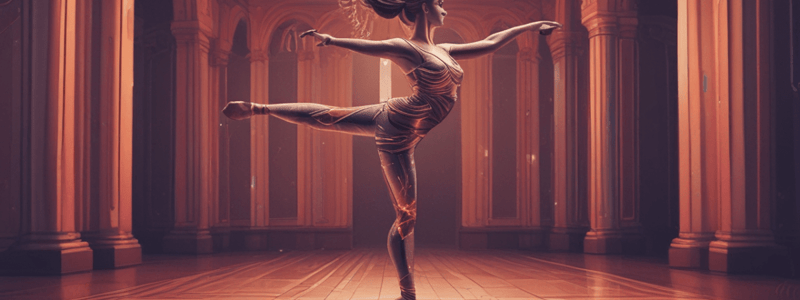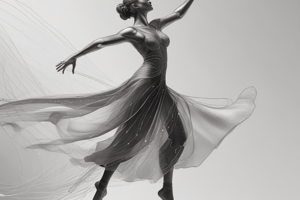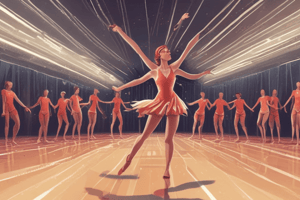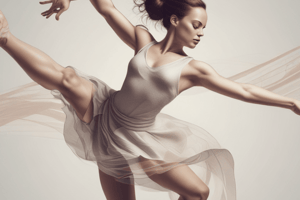Podcast
Questions and Answers
What is the importance of engaging your core muscles?
What is the importance of engaging your core muscles?
- To support your shoulders
- To relax your neck
- To support your spine (correct)
- To tighten your chest
What is the correct alignment of the head and neck?
What is the correct alignment of the head and neck?
- Aligned with the spine (correct)
- Protruding forward
- Retracted backward
- Tilted forward
What should you do to maintain proper shoulder alignment?
What should you do to maintain proper shoulder alignment?
- Keep your shoulders stiff
- Draw your shoulder blades back and down (correct)
- Raise your shoulders
- Tilt your shoulders forward
What is the purpose of maintaining a straight and elongated spine?
What is the purpose of maintaining a straight and elongated spine?
What is the correct alignment of the pelvis?
What is the correct alignment of the pelvis?
What is the correct alignment of the hips and legs?
What is the correct alignment of the hips and legs?
What is the correct alignment of the feet and ankles?
What is the correct alignment of the feet and ankles?
Why is understanding body alignment important in dance movements?
Why is understanding body alignment important in dance movements?
What is the purpose of engaging in alignment exercises and techniques?
What is the purpose of engaging in alignment exercises and techniques?
What is one way to strengthen your core muscles?
What is one way to strengthen your core muscles?
What is the primary importance of aligning the pelvis and hips in dance?
What is the primary importance of aligning the pelvis and hips in dance?
What should the shoulders be drawn to in proper alignment?
What should the shoulders be drawn to in proper alignment?
What is the purpose of maintaining an even and level alignment of the hips?
What is the purpose of maintaining an even and level alignment of the hips?
What is the primary focus of lower body alignment in dance?
What is the primary focus of lower body alignment in dance?
What is the significance of neutral alignment in dance?
What is the significance of neutral alignment in dance?
What is the purpose of maintaining good posture in dance?
What is the purpose of maintaining good posture in dance?
Why is it essential for dancers to understand body alignment?
Why is it essential for dancers to understand body alignment?
What should dancers aim to maintain when aligning their legs?
What should dancers aim to maintain when aligning their legs?
Why is it important for dancers to study and understand the alignment principles of their chosen dance style?
Why is it important for dancers to study and understand the alignment principles of their chosen dance style?
What is the result of practicing correct body alignment in dance?
What is the result of practicing correct body alignment in dance?
What is the primary reason for maintaining proper body alignment in dance?
What is the primary reason for maintaining proper body alignment in dance?
What is the fundamental principle of body alignment in dance?
What is the fundamental principle of body alignment in dance?
What is the correct alignment of the cervical spine?
What is the correct alignment of the cervical spine?
What is the purpose of engaging the core muscles in the lumbar spine?
What is the purpose of engaging the core muscles in the lumbar spine?
What is the result of maintaining a balanced and aligned pelvis, shoulders, and limbs?
What is the result of maintaining a balanced and aligned pelvis, shoulders, and limbs?
What happens when the thoracic spine is aligned correctly?
What happens when the thoracic spine is aligned correctly?
Why is proper alignment of the spine crucial for dancers?
Why is proper alignment of the spine crucial for dancers?
What is the purpose of maintaining proper body alignment in dance?
What is the purpose of maintaining proper body alignment in dance?
What is the starting position for the Pilates Roll-Up exercise?
What is the starting position for the Pilates Roll-Up exercise?
What should you check for during the Wall Posture Test?
What should you check for during the Wall Posture Test?
Which muscle group should you engage during the Wall Posture Test?
Which muscle group should you engage during the Wall Posture Test?
What should you avoid doing during the Hamstring Stretch?
What should you avoid doing during the Hamstring Stretch?
In which direction should you gently push your hips during the Hip Flexor Stretch?
In which direction should you gently push your hips during the Hip Flexor Stretch?
What is the purpose of the Turnout Alignment technique?
What is the purpose of the Turnout Alignment technique?
What is the result of Lengthening through the Crown technique?
What is the result of Lengthening through the Crown technique?
Why is it important to regularly practice alignment techniques during movement?
Why is it important to regularly practice alignment techniques during movement?
Flashcards are hidden until you start studying
Study Notes
Understanding Body Alignment in Dance
- Body alignment is crucial for both aesthetics and physical health, allowing dancers to perform movements efficiently, minimize injury risk, and enhance technique.
- Maintaining a neutral spine is a fundamental principle of body alignment, preserving the natural curves of the spine (cervical, thoracic, and lumbar).
Correct Alignment of the Spine
- Cervical Spine: Imagine a string pulling your head upwards to lengthen the neck and maintain a neutral spine position.
- Thoracic Spine: Keep the chest lifted and avoid slouching or rounding the upper back, visualizing an open chest and elongated spine.
- Lumbar Spine: Engage the core muscles to support the lower back and prevent excessive arching, maintaining a slight engagement of the abdominal muscles.
Aligning the Pelvis and Hips
- Pelvic Alignment: Maintain a neutral position, neither tilted forward nor backward, allowing for a stable base and efficient movement.
- Hip Alignment: Keep the hips level and even, avoiding letting one hip drop or shift while dancing, focusing on maintaining a stable alignment.
Balanced Shoulders and Arms
- Shoulder Alignment: Draw the shoulders down and back, away from the ears, avoiding tension or elevated shoulders.
- Arm Alignment: Keep the arms elongated and extended, visualizing a lengthening energy flowing through the arms, and maintaining a sense of opposition between the fingers and shoulder blades.
Lower Body Alignment
- Legs: Maintain equal engagement and alignment, avoiding excessive inward or outward rotation, with alignment varying depending on dance style or technique.
- Feet: Ensure even weight distribution across the feet, avoiding rolling inward or outward, and maintaining a connection with the floor.
Body Alignment in Different Dance Styles
- Body alignment can vary across different dance styles, with each style having its own set of alignment principles and requirements.
- Study and understand the alignment guidelines specific to your chosen dance style or technique.
Neutral Alignment
- Neutral alignment refers to the natural and relaxed position of the body, where all body parts are aligned in a straight line, with weight evenly distributed.
- Find and maintain neutral alignment as a starting point for all dance movements.
Posture
- Good posture involves maintaining a lengthened spine, an elongated neck, and an open chest, engaging the core muscles to support the spine and keeping the shoulders relaxed.
Head and Neck Alignment
- The head should be aligned with the spine, not tilted or protruding forward, keeping the chin parallel to the floor, and imagining a straight line from the top of the head to the base of the spine.
Shoulder Alignment
- Maintain proper shoulder alignment by keeping the shoulders relaxed and down, avoiding tension or raised shoulders, and drawing the shoulder blades back and down.
Spinal Alignment
- A straight and elongated spine is vital for proper alignment, maintaining the natural curves of the spine (cervical, thoracic, and lumbar) and engaging the core muscles to support the spine.
Pelvic Alignment
- The pelvis should be in a neutral position, neither tilted forward nor backward, engaging the muscles of the core and buttocks to facilitate alignment throughout the rest of the body.
Hip and Leg Alignment
- Maintain proper hip and leg alignment, with the hips level and squared, knees pointing straight ahead, and avoiding excessive inward or outward rotation.
Foot and Ankle Alignment
- Maintain neutral alignment of the feet, with weight distributed evenly across the ball and heel of the foot, and the ankles aligned with the legs.
Alignment in Dance Movements
- Focus on maintaining neutral alignment, engaging the core, and using the appropriate muscle groups for each movement, enhancing technique and reducing the risk of injury.
Alignment Exercises and Techniques
- Core Strengthening: Engage in exercises like plank and Pilates roll-up to strengthen the core muscles.
- Posture Alignment: Practice exercises like the wall posture test and shoulder alignment to improve posture.
- Stretching Exercises: Engage in exercises like hamstring stretch and hip flexor stretch to improve flexibility.
- Alignment Techniques during Movement: Use techniques like turnout alignment and lengthening through the crown to improve alignment during movement.
Studying That Suits You
Use AI to generate personalized quizzes and flashcards to suit your learning preferences.




